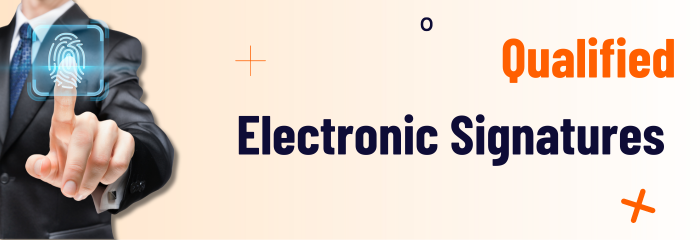- March 7, 2023
- Symphony Ragan, Content Planning & Strategy
Qualified electronic signatures (QES) are becoming increasingly important as businesses start to handle more and more of their operations digitally. But what exactly is a QES, and when should you use one? Let’s break down the definition of a qualified electronic signature and how it can make your business operations simpler and more secure.
What Is a Qualified Electronic Signature? A QES is an advanced form of electronic signature that meets certain legal standards. These signatures are legally recognized in many countries, which means they can be used to sign contracts, agreements, and other documents with confidence. Unlike traditional paper-based signatures, QESs also offer greater security—they are verified using digital certificates that identify the signer and guarantee the authenticity of the document.
How Do I Decide If I Need Qualified Electronic Signatures? When deciding whether to use qualified electronic signatures for your business, the first thing you need to consider is whether you have a need for secure digital documents. If your business handles sensitive information such as customer data or financial records, then it’s highly recommended that you use qualified electronic signatures for any documents related to these processes. Additionally, if you regularly sign contracts or agreements with customers or vendors, then you may find that switching from paper-based signatures to qualified electronic ones makes your life much easier.
Another factor to consider is the cost associated with implementing qualified electronic signatures into your workflow. While there will be upfront costs involved in setting up digital certificates and creating a secure system for signing documents electronically, this investment will quickly pay off when you see how much time and money it saves you in the long run. Plus, by using digital certificates instead of paper-based signatures, your business will benefit from increased security measures that protect both you and your clients from fraud or identity theft.
Additionally, some countries, such as those in the EU, require QES to be used to create legally binding electronic signatures. This signature type is equivalent to a handwritten signature in terms of legal effect under eIDAS standards. It is accepted in all the EU’s member nations. Foxit uses ZealiD to provide customers with QES signatures. With the ZealiD, you can use Touch or FaceID to utilize a legally binding signature to sign digital contracts after completing a quick and easy in-app registration process. The in-app registration verifies the recipient’s personal digital signature and identity. Note: QES is available for Enterprise Plans only for Foxit customers.
In conclusion, qualified electronic signatures provide a secure way to digitally sign documents while still providing legal protection under international law. Whether you need them for customer data management or contract agreements depends on the type of business you have, but chances are if you’re handling sensitive information on a regular basis, or conducting business internationally on a regular basis, then investing in QES technology is worth considering for increased security measures, compliance, and convenience purposes alike.
